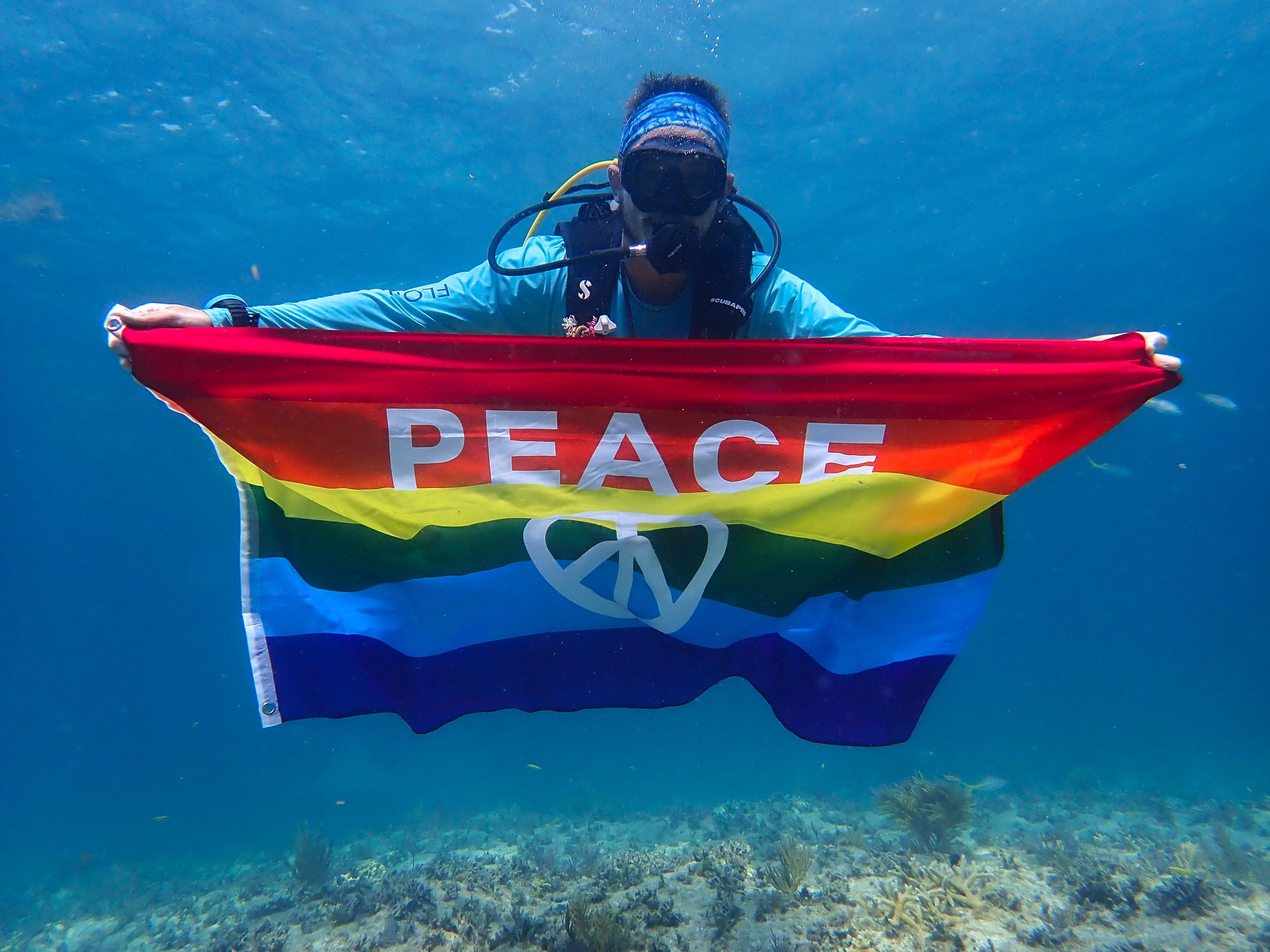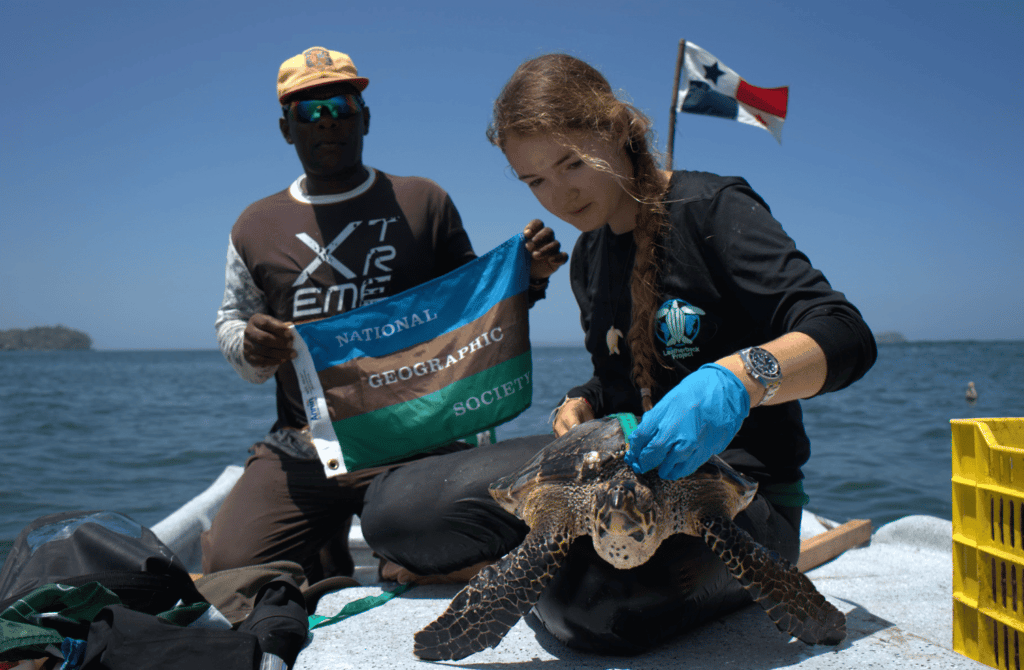Pride Month Is Over. Now What?
Lessons from LGBTQIA+ environmentalists to keep with us throughout the year.

 Why you can trust us
Why you can trust us
Founded in 2005 as an Ohio-based environmental newspaper, EcoWatch is a digital platform dedicated to publishing quality, science-based content on environmental issues, causes, and solutions.
Just because it’s July, doesn’t mean we stop celebrating diversity, learning from each other and amplifying LGBTQIA+ voices in the field. Rather, we at EcoWatch, believe in taking what we learn every June during “Pride Month” and applying it to create a more vibrant world view year-round. Therefore, we’re proud to highlight some important lessons on environmentalism and diversity from our favorite queer environmentalists and allies that we strive towards no matter the month.
1. Diversity Matters. Different Viewpoints Result in New Ways of Thinking.
“The stronger genetic diversity within a species, the healthier the population, and the more biodiversity within a forest, the healthier the ecosystem,” explained queer scientist and National Geographic explorer Callie Veelenturf (she/her). “There is a role, a place, for everyone. The more unique individuals that comprise our whole, the more we can grow and develop, expanding our knowledge along the way. Let’s celebrate our human diversity, the same way we celebrate biodiversity.”

The reason that diversity in people and experiences allows for diverse thinking is because of lived experience. Leslie Nguyen (she/her), a biracial marine scientist and the mastermind behind a recent panel on diversity within marine science, explained: “With people coming from all walks of life, everyone offers their own individual set of experiences that they carry with them. These experiences shape who we are and how we see/understand the world, meaning that everyone has something different to offer in a field of science where our understandings are constantly changing.”
For some LGBTQ+ scientists, their experiences may have taught them to “think outside of a binary,” added Annabel Gong (they/them), a queer, non-binary, Asian-American scientist and Research & Community Coordinator at the San Diego Regional Climate Collaborative. “A binary doesn’t really exist, and we bring that type of thinking into science. That can mean looking at animal behavior in a different way that may be overlooked by a straight scientist. For a gay scientist, it may look very natural. So inclusion brings different perspectives to science,” they said.
Because of this, “We must work towards maintaining a diverse pool of people in STEM, especially those from BIPOC communities,” Nguyen emphasized.
2. Collaborations Lead to New Solutions.
J.D. Reinbott (he/him), a cis-gender, openly gay marine biologist and environmental event planner agrees. Encouraging more collaboration, he said, “As environmentalists, we face dynamic challenges that need dynamic responses. Diverse voices and viewpoints bring about new ideas that can help shift our thought processes and in the end, come up with unique solutions.”

Veelenturf feels much of the same, saying, “The more diverse voices, perspectives, identifies, experiences and backgrounds, the more creative solutions we can create to combat the many societal problems we face today.”
The inclusion of diversity of all types allows for more nuanced, multi-faceted discussions and science to take place. This is the idea behind cross-pollination, which allow for new hybrids, ideas and solutions to emerge.
“But we won’t have the opportunity to hear these ideas if we don’t push for further diversity within our field,” Reinbott warned.
3. These Issues Are Complex and Intersectional.
Our human identities don’t exist in a vacuum.
“I just want to emphasize how important intersectional advocacy is,” Gong told EcoWatch. “My identity as an Asian American is not isolated from my queer, non-binary identity. They all work together to shape how society perceives me, and it is important to look internally at the privilege and oppression you hold in different spaces.” They appreciate organizations and spaces where they and other minorities feel uplifted to advocate for their entire “holistic sel[ves].”

In the same way, we must respect the deep interconnectedness and intersectionality that exists in environmental work. Fighting climate change isn’t just an environmental justice issue, it’s a social justice one, too. The World Economic Forum has stated that women have the most to lose from the climate crisis, and an EPA report found that environmental racism is real, the Atlantic reported. Indigenous stewardship of our lands and waters, long excluded from decision-making, must also factor into future plans for how we interact with our planet.
We cannot meaningfully address the climate, extinction, biodiversity, and any other environmental crisis without acknowledging that women and people of color will be the first and worst hit, and without pushing for more equitable policies.
4. Imperfect Action Beats Perfect Inaction.
When asked how we can continue to support LGBTQIA+ individuals beyond pride month, Reinbott said, “I think a lot of people get caught up in this question and allies feel like they need to be perfect in order to support this community. But, honestly, this is the furthest thing from the truth. Start small and work your way up.”

This could look like a variety of actions, including:
- Being open to “uncomfortable” conversations and listening to queer friends/coworkers when they speak.
- Ensuring your organization is being “effectively progressive.”
- Establishing and supporting workplace protocols/procedures that protect LGBTQIA+ individuals.
- Putting your pronouns in your email signature.
- Removing anyone causing harm.
- Speaking out against homophobic viewpoints, comments, and rhetoric.
- Remaining mindful of social issues happening outside that company can weigh heavily on marginalized individuals.
- Providing resources and mental, emotional, therapeutic, financial and physical support for team members year-round.
- Providing gender-affirming gear, uniforms, facilities, etc. and/or separate facilities for privacy.
- Spotlighting queer team members outside of the month of June and giving them the microphone even when it doesn’t position your company as “inclusive.”
Mckensea Margarethe, marine science communicator and founder of the “LGBTQ in Stem” Instagram community, concluded, “I honestly love it when companies/organizations celebrate the LGBTQ+ community during pride. I think the rainbow logos are actually kind of sweet. But are those places upholding what that stands for all throughout the year? Because that’s what’s important.”
Subscribe to get exclusive updates in our daily newsletter!
By signing up, you agree to the Terms of Use and Privacy Policy & to receive electronic communications from EcoWatch Media Group, which may include marketing promotions, advertisements and sponsored content.

 233k
233k  41k
41k  Subscribe
Subscribe 




